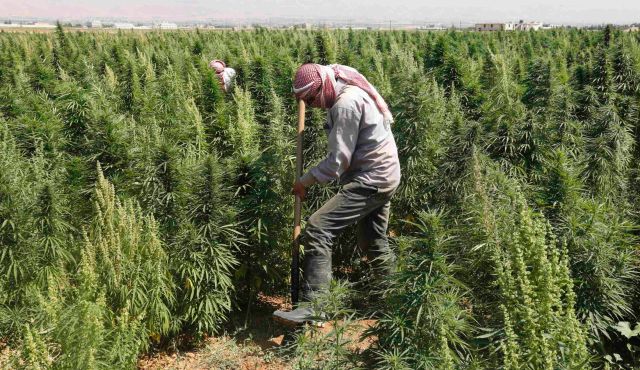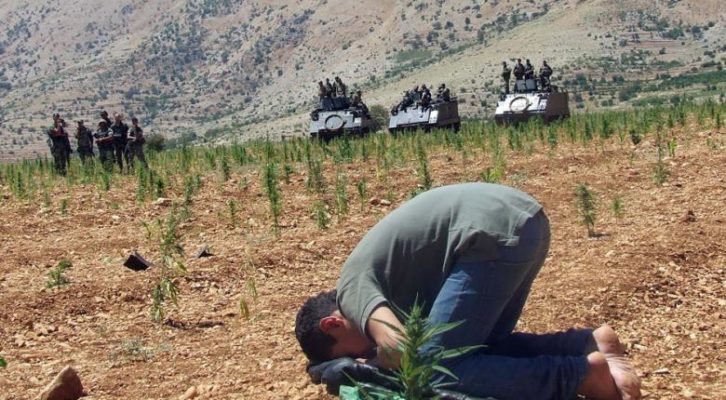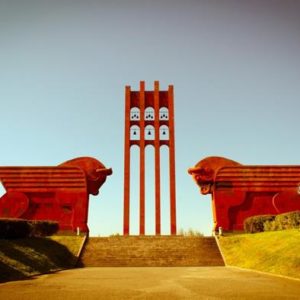The United Nations Office on Drugs and Crime ranked Lebanon in 2011 as one of the world’s top five sources of cannabis resin. Recently, cannabis (hashish) legalization became part of the Lebanese debate. While some officials and farmers are lobbying to legalize it for trade and medicinal use, others are resisting these pressures, fearing an uncontrollable market.

Farmers and some politicians are arguing that the hashish industry would bring huge amounts of revenue, and that hashish can be used for medicinal treatments. Conservatives argue that the the weak and sectarian state in Lebanon will not be able to control legalization. They fear that underground drug dealers, backed by sectarian leaders, will take the opportunity to use the drug as a weapon against each other, as happened during the civil war era.
Hashish production is currently illegal in Lebanon, and each year since the early 1990s, security forces backed by the army bulldoze the crops before they can be harvested, leaving farmers penniless. But the failure of the state to encourage the growth of legitimate crops, coupled with months of political crisis, deteriorating economic prospects and a frail security climate have encouraged farmers to return to large-scale marijuana cultivation.
Usually when there is insecurity, the cannabis farming spreads, since the government gives attention to other important security issues and turn a blind eye to the farmers. During the Lebanese civil war, 1975-1990, hashish cultivation provided funding for feuding militias and turned Lebanon into one of the world’s largest hashish exporters. Recently, as the Syrian crisis escalated the cannabis farming spread again in Bekaa Valley.
Today, Lebanon’s feuding militias are still using drugs as a source of income. Under international pressure, the conservative Lebanese government is cracking down on cannabis farmers while drug lords continue to act with impunity. Security forces confronting armed farmers defending their crops have lead to bloody gun battles between both sides.
Last year, clashes occurred between security forces, who teamed up with the army, against the farmers who were preventing state bulldozers to raze cannabis plantations. The clashes finally ceased after the government promised the farmers would receive financial compensation. However, this was never paid after the Finance Ministry announced it lacked funds to carry out the plan.
Many conservatives argue that the government in Lebanon will face difficulties in controlling the cannabis industry, and so destroying it is the best solution. On the other hand, many voices were heard from officials legitimizing the cannabis plantations. Influential politician Walid Jumblatt said last month that he supported growing cannabis for medicinal use, arguing that regulated crop cultivation would improve living conditions in poorer areas of the Bekaa Valley.
“At this stage it would have a big impact,” Jumblatt said, “Lebanon needs this farming and needs to revive the Bekaa and Akkar regions.”
In addition, economist Marwan Iskander claimed that legalizing the cannabis crop would help the impoverished Bekaa and Akkar regions develop, and would contribute $400 million to the state budget and $2 billion to the wider economy. This would come at a time when Lebanon is struggling with the fallout of the Syrian crisis.
Meanwhile, ex Tourist Minister Fadi Abboud, thinks that the most obvious reason to legalize marijuana is because it is already being farmed and smoked by many. The only difference is it’s now being controlled by criminals, and the state isn’t making any money off of it.
Thus it is important for the Lebanese state to take action and control this “underground industry” and prevent criminals from monopolizing on it. A state controlled cannabis industry would bring in revenue and open the doors to medical research, thus creating new jobs. For now at least, it remains unclear how the Lebanese sectarian state will take this initiative and whether it will be able to do it far from sectarianism and corruption.
June 10, 2014
Published at: The Leaf Online
Yeghia Tashjian holds a B.A. in political science from Haigazian University in Beirut, Lebanon. He is a Lebanese-Armenian political activist, researcher, blogger and the founder of the New Eastern Politics forum/blog. Currently, he is the regional and communication officer of Women in War, a gender-based think tank and research assistant at the Armenian Diaspora Research Center-Haigazian University. You can follow the author on Twitter @yeghig.







